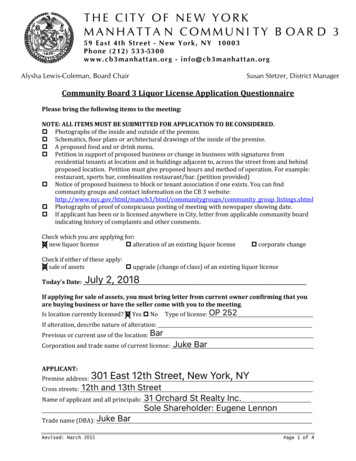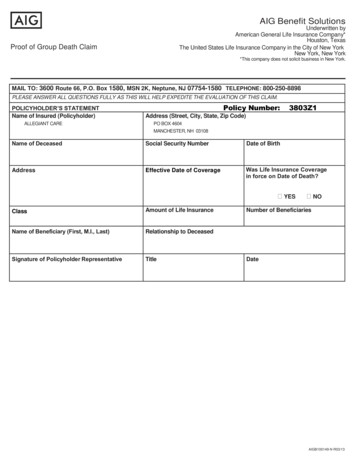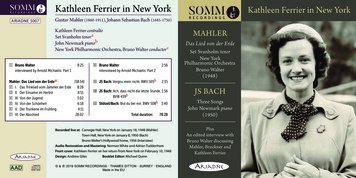
Transcription
Kathleen Ferrier in New YorkARIADNE 5007Gustav Mahler (1860-1911), Johann Sebastian Bach (1685-1750)Kathleen Ferrier contraltoSet Svanholm tenor aJohn Newmark piano bNew York Philharmonic Orchestra, Bruno Walter conductor c1 Bruno Walterinterviewed by Arnold Michaelis: Part 18:258 Bruno Walterinterviewed by Arnold Michaelis: Part 22:56Mahler: Das Lied von der Erdeac[58:54]2 I. Das Trinklied vom Jammer der Erde8:283 II. Der Einsame im Herbst8:514 III. Von der Jugend3:025 IV. Von der Schönheit6:186 V. Der Trunkene im Frühling4:117 VI. Der Abschied28:029 JS Bach: Vergiss mein nicht, BWV 505b2:35AriadneAADKathleen Ferrier in New Yorkbl JS Bach: Ach, dass nicht die letzte Stunde, 1:56BVW 439bbm Stölzel/Bach: Bist du bei mir, BWV 508b 3:40Total duration:78:28Recorded live at: Carnegie Hall, New York on January 18, 1948 (Mahler)Town Hall, New York on January 8, 1950 (Bach)Bruno Walter’s Hollywood home, 1956 (Interview)Audio Restoration and Mastering: Norman White and Adrian TuddenhamFront cover: Kathleen Ferrier on her return from New York on February 10, 1948Design: Andrew GilesBooklet Editor: Michael Quinn & 2019 SOMM RECORDINGS · THAMES DITTON · SURREY · ENGLANDMade in the EUMAHLERDas Lied von der ErdeSet Svanholm tenorNew YorkPhilharmonic OrchestraBruno Walter(1948)JS BACHThree SongsJohn Newmark piano(1950)PlusAn edited interview withBruno Walter discussingMahler, Bruckner andKathleen FerrierAriadne
Kathleen Ferrier in New York“As my first concert in Carnegie Hall drew near, I ceased all merrymaking and concentratedonly on rehearsals The last performance was broadcast all over America and themanager of the orchestra told me that there were between 15 and 20 million listeners!”Kathleen Ferrier in a 1948 article for her old school (Blackburn Girls’ High) magazine.After six days at sea, on January 7, 1948 the RMS Mauretania sailed into New Yorkharbour where Kathleen Ferrier was immediately overwhelmed by the city – thebeauty of the buildings, the elegant shops and the luxury of her hotel – all verydifferent from the London, still suffering from so much recent wartime destruction,she had left behind her.The principal reason for this, Ferrier’s first visit to the United States, was to sing GustavMahler’s Das Lied von der Erde (‘The Song of the Earth’) with the tenor Set Svanholmand the New York Philharmonic Orchestra, conducted by the veteran Mahlerian,Bruno Walter.Programme listing for Ferrier’s third Carnegie Hall appearance, heard on this recording, in 1948would also provide inspiration for a diverse array of composers that included RichardStrauss, Ernst Krenek, Schoenberg, Szymanowski and Martinů).Between January 1908 and February 1911, Mahler, an exceptionally fine conductor,had spent time in New York, both at the Metropolitan Opera and as Chief Conductorof the New York Philharmonic, sometimes appearing at Carnegie Hall, just as his pupiland friend Walter did in later years.Ferrier had first sung this “symphony for tenor and contralto” (as the composer hadinscribed the manuscript score) only four months before her American debut, at theinaugural Edinburgh International Festival, also with Walter. Then he had declared hiskeenness to introduce her to American audiences during his tenure as the NYPO’sMusic Advisor (a position he held between 1947 and 1949).Das Lied von der Erde comprises six songs, three for each of the two soloists. Thetexts used are German versions of Chinese poems of the Tang Dynasty, entitled TheChinese Flute, translated and adapted by the German poet Hans Bethge (whose workThree performances were arranged for Carnegie Hall. Still feeling the effects of a badcold, Ferrier wrote to her sister Winifred that the first of the three was greeted withmixed reviews. To add to the tension, Mahler’s widow Alma had been in the audience.23
“Some of the critics are enthusiastic,others unimpressed . My soft notescame as I’ve never known them. I was abit nervous but I did it all from memoryexcept for a few words which I hidbehind my programme, and Bruno W.told me today my German was pure andclassic and he’s thrilled.”after the third performance of Das Lied von der Erde she commented (surely with amixture of relief and regret) in a letter home:“This afternoon the performance was even better – (I thought the tenor was excellent, buthe’s hardly had a kind word!)”We are fortunate that the third concert, on January 18, 1948, was recorded and formsthe basis of this historic CD. Several different complete performances of Ferrier singingDas Lied von der Erde have been issued over the years, including the celebrated Deccaversion, also conducted by Walter. But itis important to remember that these alldate from the spring of 1952 – four yearsafter this New York performance. In 1948we hear the contralto in freshest voice(notwithstanding the troublesome cold)evidently in good spirits and delightedto be working again with Walter.If Bruno Walter was thrilled, thenKathleen Ferrier was supremelyhappy. In her endearingly frank way,she added:“The audience was lousy – when I andthe tenor and B. Walter walked on – inthat order – there was a handful ofclapping – I was stunned – I thought Imust have dropped my pants!”Tenor Set SvanholmBruno Walter had known Mahler well and had conducted the first performance of DasLied von der Erde in Munich in November 1911, six months after the composer’s death.Set Svanholm, the tenor soloist, enjoyed a career principally as a Heldentenor, singingWagner at the New York Met, at the Royal Opera House, Covent Garden, the ViennaStaatsoper and, since pre-war days, at the Royal Opera, Stockholm in his nativeSweden. He and Ferrier had never previously worked together and never did again;4After fulfilling her obligations atCarnegie Hall, Ferrier left for Chicagoand other cities of the Midwest, whereshe gave recitals and met up withmusical friends. By February 10 thatyear she was back home in London,delighted by her success but lesspleased at the considerable expensesincurred on the trip that she had to pay.Pianist John Newmark5
However, this did not deter her from undertaking two further North American toursin successive years, opportunities that earned her fame and admiration on that sideof the Atlantic.On her final visit to North America in late 1949 and early 1950, Ferrier sang at NewYork’s Town Hall, accompanied by her friend and confidant, the Canadian pianistJohn Newmark. Her performance of three songs by JS Bach – Vergiss mein nicht(BWV 505, No.71), Ach dass nicht die letzte Stunde (BWV 439, No.1) and Bist du bei mir(BWV 508)* – was a great success although, according to her correspondence, therewas some contretemps with the organisers about her programme for this recital andshe was clearly upset. She wrote to her agent, Emmie Tillett:“I thought I dithered like an un-set jelly, but the critics were good”and to her diary she confided:“Very nervous, but staggered through”.There is no sign of upset nerves in the fine recording taken at the concert; indeed,writing again to Mrs Tillett, Ferrier mentioned:“A German came up to someone and said – of course I was German, because my Germanpronunciation was perfect and I sang English with a marked accent. (It’s true, honest!) Ididn’t know my Lancashire came through quite so strongly!”It has been averred by several writers that Mahler’s study of, and admiration for, themusic of JS Bach considerably influenced some of his later works, including Das Liedvon der Erde. How appropriate, then, that these two composers are paired on this CDin live performances given in New York 70 years ago.6The interview included on this CD (Tracks 1 and 8 ) between Bruno Walter andArnold Michaelis, dates from 1956. Michaelis was an executive in the Masterworksdepartment of Columbia Records and he was asked to conduct the interview in orderto advertise the maestro’s recently-issued recordings and to mark his forthcoming80th birthday in September that year.Columbia was so delighted with the outcome that it published the resultingencounter as an LP disc. This has now been edited for inclusion here to concentrate(in Track 1 ) on Walter’s memories of his teacher and mentor Gustav Mahler and onMahler’s links to his teacher, the composer and organist Anton Bruckner.Walter’s touching tribute to Kathleen Ferrier (Track 8 ), shows the depth of affection,admiration and friendship that they shared during an association which lasted onlyfive years. It was an all-too short-lived collaboration that has become legendary inmusical history and one which, through their recordings together, will continue to beenjoyed as long as they are remembered.* Bist du bei mir is now known to have been composed by Gottfried Stölzel in 1718for his opera Diomedes. A copy of the aria was later found in Bach’s Anna MagdalenaNotebook and was formerly attributed to him.Paul Campion 2019Paul Campion’s Ferrier – A Career Recorded was publishedby Thames Publishing in 2005All quotations taken from Christopher Fifield’sLetters and Diaries of Kathleen Ferrier (Boydell Press, 2011)7
Conductor Bruno Walterfeatured on the cover of theCarnegie Hall programmefor the performance ofDas Lied von Der Erdeheard on this recording.8Das Lied von der Erde (The Song of the Earth)Hans Bethge (1876-1946)2 Das Trinklied vom Jammer der ErdeDrinking Song of Earth’s MiserySchon winkt der Wein im goldnen Pokale,doch trinkt noch nicht,erst Sing Ich euch Ein Lied!Das Lied vom Kummer soll auflachendin die Seele euch klingen.Wenn der Kummer naht,liegen wüst die Gärten der Seele,welkt hin und stirbt die Freude, der Gesang.Dunkel ist das Leben, ist der Tod.Wine is already sparkling in the golden gobletbut do not drink yet,first I will sing you a song!The song of care shall soundlaughing in your soul.When care draws near,the gardens of the soul like waste,joy and singing fade away and die.Dark is life; dark is death.Herr dieses Hauses!Dein Keller birgt die Fülle des goldenen Wein!Hier, diese lange Laute nenn’ ich mein!Die Laute schlagen und die Gläser leeren,das sind die Dinge, die zusammen passen.Ein voller Becher Weins zur rechten Zeitist mehr wert, als alle Reiche dieser Erde!Dunkel is das Leben, ist der Tod.Lord of this house!Your cellar holds abundance of golden wine!I call this lute here my own!To strike the lute and to drain the glasses,those are the things which go together.a brimming cup of wine at the right timeis worth more than all the riches of this earth!Dark is life; dark is death!Das Firmament blaut ewig und die Erdewird lange fest stehen und aufblühn im Lenz.Du aber, Mensch, wie lang lebst denn du?Nicht hundert Jahre darfst du dich ergötzenan all dem morschen Tande dieser Erde!The heavens are ever blue and the earthwill long stand fast and blossom forth in spring.But thou, O man, how long wilt thou live?Not one hundred years may’st thou enjoy thyselfwith all the rotting trifles of this earth!9
Seht dort hinab!Im Mondschein auf den Gräbern hockteine wildgespenstische Gestalt – Ein Aff ist’s!Hört ihr, wie sein Heulen hinausgelltin den süssen Duft des Lebens!Look down there! In the moonlight on the gravesthere crouches a wild and ghostly form –it is an ape! Listen, how its howlingListen, how its howling rings outamidst the sweet scent of life!Jetzt nehm den Wein! Jetzt ist es Zeit, Genossen!Leert eure goldnen Becher zu Grund!Dunkel ist das Leben, ist der Tod!Now take up the wine! Now, friends, it is time!Drain your golden cups to the depths!Dark is life; dark is death!3 Der Einsame im HerbstAutumn LonelinessHerbstnebel wallen bläulich überm See;vom Reif bezogen stehen alle Gräser;man meint’, ein Künstler habe Staub vom Jadeüber die feinen Blüten ausgestreut.Der süsse Duft der Blumen is verflogen;ein kalter Wind beugt ihre Stengel nieder.Bald werden die verwelkten, goldnen Blätterder Lotosblüten auf dem Wasser ziehn.Mein Herz ist müde. Meine kleine LampeErlosch mit Knistern;es gemahnt mich an den SchlafIch komm zu dir, traute Ruhestätte!Ja, gib mir Ruh, ich hab Erquickung not!Ich weine viel in meinen Einsamkeiten.Der Herbst in meinem Herzen währt zu lange.Sonne der Liebe, willst du nie mehr scheinen,um meine bittern Tränen mild aufzutrocknen?The autumn mists drift blue over the lake;the blades of grass stand covered with frost;one would think an artist had strewn jade-dustover the delicate blossoms.The flower’s sweet scent is gone;an icy wind bends down their stems.Soon the withered golden leavesof the lotus-flowers will be drifting on the water.My heart is weary. My little lamphas gone out with a sputter;it urges me to go to sleep.I come to you, beloved place of rest.Yes, give me rest; I need refreshment!Long do I weep in my loneliness.The autumn in my heart endures too long.Sun of love, will you never shine again,tenderly to dry my bitter tears?104 Von der JugendOf YouthMitten in dem kleinen Teichesteht ein Pavillon aus grünemund aus weissem Porzellan.Wie der Rücken eines Tigerswölbt die Brücke sich aus Jadezu dem Pavillon hinüber.In dem Häuschen sitzen Freunde,schön gekleidet, trinken, plaudern,manche schreiben Verse nieder.Ihre seidnen Ärmel gleitenrückwärts, ihre seidnen Mützenhocken lustig tief im Nacken.Auf des kleinen Teiches stillerWasserfläche zeigt sich alleswunderlich im Spiegelbilde.Alles auf dem Kopfe stehendin dem Pavillon aus grünemund aus weissem Porzellan;wie ein Halbmond steht die Brücke,umgekehrt der Bogen. Freunde,schön gekleidet, trinken, plaudern.In the middle of the little poolstands a pavilion of greenand white porcelain.Like a tiger’s back,the jade bridge arches itselfover to the pavilion.In the little house friends are sittingprettily dressed, drinking and chattering;some are writing down verses.Their silk sleeves fallbackwards, their silk caps fallroguishly over their necks.On the still surface of the little pooleverything is reflectedwonderfully as in a mirror.Everything is standing on its headin the pavilion of greenand white porcelain.The bridge stands like a half-moonwith its arch upside-down. Friendsprettily dressed are drinking and chattering.11
5 Von der SchönheitOf BeautyJunge Mädchen pflücken Blumen,pflücken Lotosblumen an dem Uferrande.Zwischen Büschen und Blättern sitzen sie,sammeln Blüten in den Schoss und rufensich einander Neckereien zu.Gold’ne Sonne webt um die Gestalten,spiegelt sie im blanken Wasser wider.Sonne spiegelt ihre schlanken Glieder,ihre süssen Augen wider,und der Zephyrhebt mit Schmeichelkosen das Gewebeihrer Ärmel auf, führt den Zauberihrer Wohlgerüche durch die Luft.O sieh, was tummeln sich für schöne Knabendort an dem Uferrand auf mut’gen Rossen,weithin glänzend wie die Sonnenstrahlen;schon zwischen dem Geäst der grünen Weidentrabt das jungfrische Volk einher!Das Ross des einen wiehert fröhlich aufund scheut und saust dahin;über Blumen, Gräser, wanken hin die Hufe,sie zerstampfen jäh im Sturmdie hingesunknen Blüten.Hei! Wie flattern im Taumel seine Mähnen,dampfen heiss die Nüstern!Gold’ne Sonne webt um die Gestalten,spiegelt sie im blanken Wasser wider.Young girls are picking flowers,lotus-flowers by the riverbank.They are sitting among the bushes and the leaves,gathering blossoms in their laps and callingteasingly to one another.The golden sun shines over their formsand reflects them in the clear water;the sun reflects their slender limbs,and their sweet eyes.And the breezelifts their embroidered sleevescaressingly, and carries the magic oftheir perfume through the air.Oh see, what fair youths are thosethere by the river-bank on their brave steeds,flashing in the distance like sunbeams,the gay young men are trotting by,among the branches of the green willows!The steed of one of them neighs merrily,hesitates and plunges on.His hooves pass over flowers and grass;stormily they trample downthe fallen blossoms.How his mane tosses in frenzy!Hot steam blows from his nostrils.The golden sun shines over the formsand reflects them in the clear water.12Und die schönste von den Jungfraun sendetlange Blicke ihm der Sehnsucht nach.Ihre stolze Haltung is nur Verstellung.In dem Funkeln ihrer grossen Augen,in dem Dunkel ihres heissen Blicksschwingt klagend noch die Erregungihres Herzens nach.And the fairest of the maidens castslooks of longing after him.Her proud bearing is only pretence.In the flashing of her large eyes,in the darkness of her warm glances,her anxious heartcries after him.6 Der Trunkene im FrühlingThe Drunkard in SpringWenn nur ein Traum das Dasein ist,warum denn Müh und Plag?Ich trinke, bis ich nicht mehr kann,den ganzen, lieben Tag!Und wenn ich nicht mehr trinken kann,weil Leib und Kehle voll,so tauml’ ich hin vor meiner Türund schlafe wundervoll!Was hör ich beim Erwachen? Horch!Ein Vogel singt im Baum.Ich frag ihn, ob schon Frühling sei,mir ist als wie im Traum.der Vogel zwitschert: “Ja! Der Lenzist da, sei kommen über Nacht!”Ich seufze tief ergriffen aufder Vogel singt und lacht!Ich fülle mir den Becher neuund leer ihn bis zum GrundIf life is but a dream,why are there toil and misery?I drink till I can drink no morethe whole, long, merry day!And when I can drink no more,for body and mind are sated,I stagger to my doorand sleep wonderfully.And what do I hear when I awake?Hark! A bird is singing in the tree.I ask him if it is already spring;it seems to me like a dream.The bird twitters: Yes! Springis here; it came overnight!With deep attention I listened for it;the bird sings and laughs!I fill my glass anewand drain it to the bottom,13
und singe, bis der Mond erglänztam schwarzen Firmament!Und wenn ich nicht mehr singen kann,so schlaf ich wieder ein,Was geht denn mich der Frühling an!?Lasst mich betrunken sein!and sing until the moon shines outin the dark heavens.And when I can sing no more,I fall asleep again.What have I to do with spring?Let me remain a drunkard!7 Der AbschiedFarewellDie Sonne scheidet hinter dem Gebirge.In alle Täler steigt der Abend niedermit seinen Schatten, die voll Kühlung sind.O sieh! Wie eine Silberbarke schwebtder Mond am blauen Himmelssee herauf.Ich spüre eines feinen Windes Wehnhinter den dunklen Fichten!der Bach singt voller Wohllautdurch das Dunkel.Die Blumen blassen im Dämmerschein.Die Erde atmet voll von Ruh und Schlaf,alle Sehnsucht will nun träumen.Die müden Menschen gehn heimwärts,um im Schlaf vergessnes Glückund Jugend neu zu lernen!Die Vögel hocken still in ihren Zweigen.Die Welt schläft ein!Es wehet kühl im Schatten meiner Fichten.The sun sinks behind the mountains.Evening falls in the valleyswith its shadows, full of cooling freshness.See, how the moon above floats like a silver shipon the blue sea of the heavens.I feel a gentle wind blowingbehind the dark pines!The brook sings loud and melodiousthrough the darkness.The flowers grow pale in the twilight.The earth breathes deeply in rest and sleep.All longing now has turned to dreaming,the tired people go homewardsto find forgotten happiness in sleepand to learn youth anew!The birds crouch silent on the branches.The world falls asleep!There is a cool breeze in the shadow of the pines.14Ich stehe hier und harre meines Freundes;ich harre sein zum letzten Lebewohl.Ich sehne mich, O Freund, an deiner Seitedie Schönheit dieses Abends zu geniessen.Wo bleibst du? Du lässt mich lang allein!Ich wandle auf und nieder mit meiner Lauteauf Wegen, die vom weichen Grase schwellen.O Schönheit!O ewigen Liebens – Lebenstrunkne Welt!Er stieg vom Pferd und reichte ihm den Trunkdes Abschieds dar.Er fragte ihn, wohin er führeund auch warum es müsste sein.Er sprach, seine Stimme war umflort:Du, mein Freund,mir war auf dieser Welt das Glück nicht hold!Wohin ich geh?Ich geh, ich wandre in die Berge.Ich suche Ruhe für mein einsam Herz.Ich wandle nach der Heimat, meiner Stätte.Ich werde niemals in die Ferne schweifen.Still ist mein Herz und harret seiner Stunde!Die liebe Erde allüberallblüht auf im Lenz und grünt Aufs neu!Allüberall und ewigblauen licht die Fernen!Ewig ewig I stand here waiting for my friend;I wait for him to take a last farewell.I long, my friend, to enjoy the beautyof the evening at your side.Where are you? You have left me alone so long!I wander up and down with my luteon paths rich with soft grass.O beauty!O world, drunk for ever with love and life!He dismounted and gave himthe parting cup.He asked him where he was going,and also why it must be.He spoke, and his tones were veiled;O my friend,fortune was not kind to me in this world!Where am I going?I shall wander in the mountains,I am seeking rest for my lonely heart.I shall wander to my native land, to my home.I shall never roam abroad.Still is my heart; it is awaiting its hour!Everywhere the lovely earthblossoms forth in spring and grows green anew,Everywhere, for ever,horizons are blue and bright!For ever and ever 15
9 Vergiss mein nicht (Do not forget me) BWV 505Gottfried Arnold (1666-1714)Vergiss mein nicht, vergiss mein nicht,Mein allerliebster Gott.Ach, höre doch mein Flehen,Ach, lass mir Gnad’ geschehen,Wenn ich hab’ Angst und Not.Du meine Zuversicht,Vergiss mein nicht, Vergiss mein nicht!Do not forget me, do not forget me,My beloved God.Oh, hear my supplication,Oh, grant me mercy,When I am afraid and in distress.In you I trust,Do not forget me, do not forget me!Vergiss mein nicht, Vergiss mein nicht,Wenn einst der herbe TodMir nimmt mein zeitlich’ Leben;Du kannst ein bess’res geben.Mein allerliebster Gott.Hör, wenn dein Kind doch spricht;Vergiss mein nicht, Vergiss mein nicht.Do not forget me, do not forget me,When bitter deathTakes my mortal life from me;You can give a better one.My beloved God,Hear your child’s words;Do not forget me, do not forget me.Gute Nacht, ihr Eitelkeiten!Falsches Leben, gute Nacht!Gute Nacht, ihr schnöden Zeiten,Denn mein Abschied ist gemacht!Weil ich lebe, will ich sterben,Bis die Todesstunde schlägt,Da man mich als Gottes ErbenDurch das Grab in Himmel trägt.Good night, vanities!Good night, false life!Good night, evil times,I take my leave!As I live, I wish to die,Until the hour of death strikes,When, as God’s heir, I will beCarried to heaven by way of the grave.bm Bist du bei mir (If thou art near) BWV 508Anon.Bist du bei mir, geh’ ich mit FreudenZum Sterben und zu meiner Ruh’.Ach, wie vergnügt wär’ so mein Ende,Es drückten deine schönen HändeMir die getreuen Augen zu.If thou art near, then I with gladnessTo death will go and to my rest.Happy my end free from all sighingIf thou wilt close when I am dyingThe eyes that loved to look on thee.bl Ach, dass nicht die letzte Stunde (Ah! Why has not the final hour) BWV 439Erdmann Neumeister (1671-1756)Ach, dass nicht die letzte StundeMeines Lebens heute schlägt!Mich verlangt von Herzens Grunde,Dass man mich zu Grabe trägt;Denn ich darf den Tod nicht scheuen,Ich bin längst mit ihm bekannt,Führt er doch aus WüsteneienMich in das gelobte Land.Ah! Why has not the final hourOf my life struck today!From the depths of my heartI wish to be carried to the grave;For I need not fear death,I have known him for a long time.He leads me out of the wildernessInto the Promised Land.16Texts and translations courtesy of the Decca Record Company Ltd.17
Recording Das Lied von der Erde in Carnegie Hallrecorded in 1948, including an occasional cough and unwonted applause after thefirst song. This is, indeed, a real concert!This historic recording was madeby The Carnegie Hall RecordingCompany, an independent businessrun from the backstage area of thehall between the 1940s and the 1960s.Many great artists were thus recordedat public performances, notablyduring the Sunday concerts of theNew York Philharmonic Orchestra,which were broadcast by CBS; therecordings were not for commercialsale, but rather intended for the useof CBS or the orchestra.Four of the songs required more than one 78rpm side (for which the maximumlength was approximately four minutes) and now it has been possible to join thesebreaks seamlessly throughout the performance, maintaining the aural and artisticintegrity of a memorable occasion.Paul Campion 2019With thanks to Rob Hudson – Manager of the Carnegie Hall Archives.SOMM Recordings and Paul Campion wish to thank the following for theirassistance with this recording:Original acetate disc label of live recordingmade by the Carnegie Hall Recording Co.The performance is preserved on seven double-sided 78rpm acetate transcriptiondiscs, which have survived over 70 years in good condition. Such discs aresusceptible to damage through over-playing and some light surface noise isoccasionally apparent.Larry LustigDavid MasonJoe PearceNorman WhiteSeth B WinnerThe Vocal Record Collectors’ Society: www.collup.com/vrcs/vrcs.htmlSpecial thanks are due to Julia and John Spencer.No attempt has been made to remove all such noise, as this would also compromisethe true sound of the voices and orchestra, as well as the ambience of the hall. Lowfrequency rumble has been reduced and care taken to ensure that correct pitchis maintained throughout. Other than that, the performance is as broadcast andPhotographs and archive images by courtesy of Paul Campion,with thanks from SOMM.1819
Lied von der Erde in Munich in November 1911, six months after the composer's death. Set Svanholm, the tenor . Stockholm in his native Sweden. He and Ferrier had never previously worked together and never did again; after the third performance of Das Lied von der Erde she commented (surely with a mixture of relief and regret) in a letter .
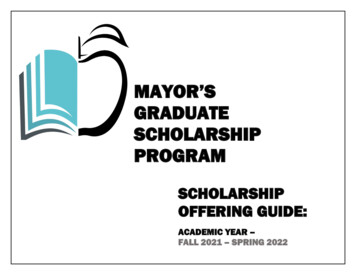

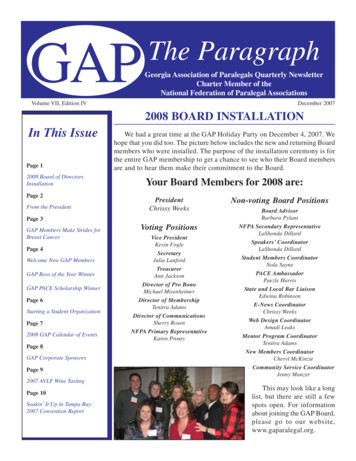

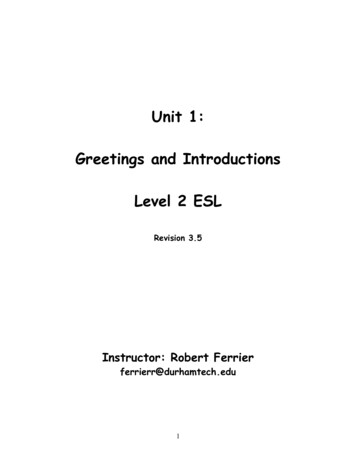
![[Ferrier, Denise R.] Lippincott Illustrated Review(z-lib )](/img/16/lippincott-illustrated-chapter-8-glycolysis.jpg)

